#as such i have no clue how cohesive it is
Explore tagged Tumblr posts
Note
talk to me about ur liam thoughts hello
OF COURSE i need to talk about liam at least once a day or i explode
ive been spending a lot of time trying to like COMPLETELY figure out his personality bc its so subtle (WHICH is certainly at least somewhat intentional) and so far its like. every time i rewatch one i find AANOTHER aspect of his personality i didnt notice
for example this guy does NOT seem confrontational by nature. like many times in s1 when airy is fucking things up liam is like. um no thanks :) . it rly looks like his go-to in stressful situations is to wait things out, and the only reason he starts to deviate from this is bc it v much starts to be clear that this situation is Not smth he can wait out. his interacts w bryce and airy in s2 VERY much come across as like... this is not his usual pace and that alone is a key factor in him being So Extremely Stressed. he wants to get the others out as fast as possible and the fact that thats NOT smth he can simply wait out is NOT helping. hes confrontational as a last resort and a last resort only
(side note that the only times he seems to get verbally pissed off w ppl is when theyre being hypocritical, ignoring key details, etc. thatperson has also mentioned him being very practical? and i think thats accurate. like i think if someone asked him abt the trolley problem hed end up begrudgingly picking to save the group of ppl; he would LOVE if everyone is saved, but i think under stress/extreme conditions he sometimes relies on a very Autism sense of Numerically, What Is The Most Beneficial Outcome?)
im also?? working on a far too indepth essay post (it is currently at 659 words) and like. the post is specifically regarding Why He Acts How He Does In Ep 18, and?? i have to go back over it again to check, but the topic of Him Being Angry is a factor but not the main point so since im tqalking abt his personality rn ill put it here, is that??? he does NOT get mad easily. even when he argues w bryce im p sure its bc bryce has a more emotional response to things than he does (important note, that bryce was very good at talking to oscar while liam wasnt!! despite them often being seen like pessimistic logical person and optimistic emotional person, im pretty sure its the OPPOSITE, it simply looks the other way bc the situation highlights their personalities in a Very Interesting Way) and liam is stressed so he does NOT rly Get It. i dont think hes even angry at bryce half of the time during most of the arguments. liam seems to naturally say many things that could be taken as being rude to say wo them being intended as such and i think that extends to arguing. i think during aarguments he is simply Loud bc "ahhhh people need to LISTEN to me and volume does that" though i need to keep looking into this more so this interpretation of liam is potentially subject to change
#ask#put this under a readmore bc im actually gonna tag this and i dont wanna clog the tag#bc ive been wanting to post many of these ideas for a while but keep forgetting to LOL#hfjone#ALSO i hope this is what u were looking for . bc my autism was activated and i need to talk about every aspect of liam ever#and ended up getting VERY enthusiastic abt this topic bc i think abt it SO much#as such i have no clue how cohesive it is#ANYWAY thank you so so much for asking me about liam . he is on my mind EVERY day of my life
27 notes
·
View notes
Text

New character I designed for myself the other day! :D Her name's Cassidy Snyder and she WILL rob you blind when you're not lookin' (or while you ARE looking, even. she don't give a care)
#Kaileys Art#Kailey Makes A Queue#Cassidy Snyder#For those of you who may notice the MTG symbols and such up there to clarify I do Not play the game- my girlfriend does!!!#And she's made several characters for the world(s?) of MTG and I wanted to participate :D so I have Cassidy!!#I have no sweet clue how the game works all I know is Art Pretty and my girlfriend's concepts are exceedingly awesome and I wanna play doll#I'm REALLY proud of Cassidy's design too.. She just looks so good. I schemed on her design for a While and she turned out amazing#I love limiting the palettes of the characters I create and trying to reuse colours where I can it makes the designs look so.. Cohesive?
39 notes
·
View notes
Note
Good luck on the ref sheets!! (And also do take your time on them! They can be hard)
The two main things I’m wondering is why Stanley’s eyes are yellow, and what happened to with the timekeeper? I see a lot of different takes of them so I am curious!
(Perfectly fine if you don’t know yet btw!)
thank u!! and oh boy both good questions!
so for stanley, the yellow eyes was more a stylistic choice to visualize a hc I have that the Narrator sees everything happening in the game through Stanley's eyes (like watching it through a camera, if that makes sense.) for my variations, it's been like that for as long as Stanley's been in the game and has only ever 'disconnected' a handful of times- the endings where the narrator goes completely quiet and seems to disappear entirely. This can happen either from Stanley breaking the game by doing something the narrator hadn't prepared anything for, like in the Escape Pod Ending, or Stanley entering parts of the parable that the narrator isnt supposed to be in like the Heaven Ending and the Museum Ending.
shorter version, narrator watches stanley play through the game like this, yellow is basically just a 'power on' sign. visual below if that helps!

and in regards to 432?

#ill prob make another post focusing on TK soon#bc this one is already a spiraling tangent bc i have no clue how to order my thoughts cohesively#but!!#hope this atleast kinda answers your question!#the stanley parable#tsp#tspud#tsp stanley#the stanley parable ultra deluxe#tsp timekeeper#tsp 432#moth answers
13 notes
·
View notes
Text
i feel like every time i make art it's a "trust the process" kinda thing except once im done i realize i shouldnt have trusted the process bc it looks bad BFKRNFKF
#aka i just made a collage and i genuinely am Obsessed w the visuals of it but oh my fucking god i hate picking text#i feel like text ruins everything bc it just looks so. disconnected. from the rest and i have NOOO clue how to make it look cohesive ever#if anybody. at all. has any tips for how to make fonts and text and whatever look better tell me bc im dying#txt
6 notes
·
View notes
Text
hmm something something neo-classicists in the 18th century not paying much attention to the bronze age pieces of literature (iliad & odyssey) because they didn't reflect the values they pushed on people so they only portrayed classical era stuff which promoted ideas of overwhelming patriotism and blind loyalty to the state hmm something something the iliad portrayed the horrors of war which they always tried to justify and glamorize and so the romanticization/obsession with rome started because of the ideas of loyalty and "honor" and whatever the fuck idk i can barely type rn
#classics#neo classical#neo classicism#iliad#i have no clue how to tag this bro#my thoughts are not cohesive at the moment
3 notes
·
View notes
Note
I’m so obsessed with Perv!Dick as if I wouldn’t end up incredibly depressed in that scenario, butttttt
Dick bringing Roy over to have fun with you, telling you that Tim is into threesomes and you shouldn’t worry now because Roy isn’t nearly as intense as Kon (Tim’s threesome partner of choice) while he’s backing you up until your back hits Roy’s chest, caging you between the two men? Is this something?
IT’S SOMETHING! Anon, this ask shut off my brain for like 8 hours straight and then a bunch of other times intermittently whenever I thought about it. Oh to be sandwiched between Dick and Roy, I would die happy. Here is the most cohesive response I would muster with the stray pieces of thoughts I could pluck from rattling around my brain. Good work anon 💖 Warnings: Perv!Dick, F/M/M, coercion, manipulation, Dick being possessive ━ [Part 1] ━ [Part 2] ━ [Part 4]

Dick knows he’s pushing his luck; his heart feels heavy with guilt as he watches you pick at the beds of your nails.
“I don’t know, Dick.” You’ve had this look on your face, like a kicked puppy, all big wet eyes and pouty lips since you’d opened the door to find not one, but two pairs of eyes staring back at you. He feels bad, but more than that he wants to fuck the pitiful expression right off your face. “I’ve been thinking maybe I should save some firsts for Tim.”
“I get that, you’re right.” Dick agrees purely for the sake of giving you some perceived agency back, ignoring the way Roy crosses his arms and quirks a brow from behind you. That’s another part of it, proving to Roy that he really does have you wrapped around his finger after bragging about you incessantly. “If you would rather your first threesome be with Tim and Kon, I totally understand.”
“K-Kon?” You stutter, eyes growing even bigger at the sound of his name.
Dick knows you’ve met Kon exactly once before at a birthday gathering for Tim and that it hadn’t been the best experience for you. Kon rarely has bad intentions, he’s just a little rough around the edges. You’d incidentally gotten in his way on the dance floor at some point, and it had resulted in some pretty nasty, but entirely accidental bruising and Kon hadn't really been given the chance to apologise, which he absolutely would have, if Dick hadn't swept you off the dance floor so he could 'tend' to you before Tim or Kon could get a look in.
“Oh, that's right, those two are tight.” Roy clues in on the play and you swing around to watch as he goes on. “Good guy, bit much though. Doesn’t know his own strength. I once watched hi- Ah, you… don’t wanna hear this, hon.”
“No…” You’re looking at Roy with that same innocently curious look you’d given Dick the first time he’s sunk his fingers into your tight little pussy. Roy’s chest immediately starts to puff up, his freckled skin turning reddish with arousal as he throws Dick a glance that says ‘wow!’. “I think I do.”
“Really you don’t.” Dick tells you and you turn to face him again, stepping back when you realise how close he’d gotten while your back was turned. You raise your hands unconsciously and Dick takes them in his own, tenderly pressing your palms to his chest, to his heart, really amping up the soft, understanding 'brother-in-law' angle as he goes on. “If you want to wait for Tim and Kon to tag team you, that’s totally your prerogative, but the offer is on the table.”
You’ve also only met Roy once more before tonight. He had this easy sort of confidence with the ladies. Before Dick has purposely interrupted, selfishly wanting you all to himself, Roy had offered you a charmingly mellow smile that has intrigued you. Before he'd even introduced himself, he had a hand on the small of your back, strong fingers massaging your skin in much the same way he does now.
You hadn't even noticed how Dick had been herding you toward your guest until your back was pressed against Roy’s solid chest. Roy’s hands tread ever so carefully around your hips, creeping under your shirt, the tips of his fingers are hard and warm against your skin. He leans into your shoulder until his stubble scratches at your neck and his voice reverberates down your spine as he talks directly into your ear. “We can be real gentle with you.”
They won’t be gentle. They’ll start off slow and calm. Roy kissing your neck, stroking your hair, whispering sweet words to you while Dick warms you up. Getting you off and stretching you out on his fingers, just like he’s done countless times before. He’s got your pretty pussy memorised and he’s gonna make sure you’re wet and ready to take them both.
But once your lips are around Roy’s cock and Dick is balls deep inside you, all bets are off.
"Fuck- You suck it like a pro, doll."
"Who taught you that, baby?"
Even if your mouth weren't to full, you're to cock drunk to interject when they converse about how good your pussy feels, or how well you take it while they pile into you from both ends.
You're nervous about loosing your anal virginity, but between that and taking them both in your cunt, you'd much rather let Dick put it in your ass, and he coos in your ear the whole time about how you're such a good girl, you're doing such a good job, making them both feel so good.
But when Roy applauds how tight your pussy is when he starts stretching it out in places Dick's cock couldn't reach; Dick tells him to pull your hair, cause he knows how it makes your walls clench and your eyes roll back.
It's overwhelming, four big strong hands groping and caressing you incessantly. The sick, wet sound of skin slapping echos through the room. The scent of sex and musk fills your nose. You can't look away from them both at the same time, and whenever you close your eyes Dick pries them open again or slaps your buttcheeks until you get the point. He can't stand not getting the full picture, he loves how expressive your eyes are.
When it's over Roy gives you his number. "In case you ever wanna trade Tim in for 'an upgrade'."
Dick smacks him across the back of the head.
#roys cock is bigger than dicks you can't change my mind#anon#gilverrrambles#perv!dick#thanks for the ask!#dick grayson/reader#dick grayson x reader#dick grayson#nightwing#nightwing x reader#nightwing/reader#roy harper/reader#roy harper x reader#roy harper#arsenal x reader#arsenal#arsenal/reader#nsft#tw dubcon#f reader#reader insert
253 notes
·
View notes
Text
How to Make your Writing Less Stiff 4
Let’s keep this train rollin’! This time less down to line edits and more overall scope of your narrative
Part 3
1. Foreshadowing
Nothing quite like the catharsis of accurately predicting where something’s going to go. It doesn’t have to be a huge plot twist or a character death, it can (and should) be little things that reward your audience for paying attention. Double points if it adds to rewatch/re-readability.
Example: In The Dark Knight, this exchange happens:
Harvey: “You’ve known Rachel all her life.”
Alfred: “Oh, not yet, Sir.”
You won’t think anything of it on your first watch. Alfred is just making a witty joke that throws Harvey off. Watch the movie again, when Rachel dies, and it becomes some incredibly dark foreshadowing. Turns out Alfred has, actually, known Rachel all her life.
2. Chekhov’s Gun
Chekhov’s Gun is a narrative concept where a seemingly inconsequential element introduced at some point in the narrative (a gun) must “fire” by the end of the narrative. Sometimes this element leaves audiences uneasy or anxious, because they know something bad must come of it. Sometimes they think nothing of it until it’s about to fire and you get a one-two punch of the realization that it’s about to hit, and then the impact of the hit. It helps create tension, and tension is incredibly important (if you want a whole post of my take on it, lmk).
It also helps your narrative look more cohesive, where nothing is left on the table. Your set-ups and payoffs leave no threads dangling.
3. Repetition
The Rule of threes can apply on a micro and macro scale. I like doing lists of adjectives in threes, (e.g. My cat is soft, fluffy, and adorable) because the cadence and the flow of three is something we’re familiar with in spoken language. We like three supporting examples for an argument. Any less doesn’t feel strong enough, any more feels like you’re trying too hard. This is not a rule it’s a suggestion.
On a grander scale, you can look at the script of Curse of the Black Pearl for a masterclass in macro rules of three, like three parlays. Doing this helps your narrative look more cohesive and like every detail is thoroughly interwoven and nothing is coincidence. Your audience will get to the third instance and mimic that DiCaprio pointing meme—they will absolutely notice.
4. Motifs
Motifs as well, beyond threes, help. Colors are a huge one. For example every time you mention the color purple, you could attach it to an emotion, or a character, or an important plot beat, like how leitmotifs work for character themes in movies and TV shows.
Obvious examples in film are like lightsaber colors or dressing up the good guys in white and the bad guys in black. I did this whole post about color in fiction.
It’s a lot of other things too. Weather elements and times of day, or specific inconsequential objects popping up over and over again, like birds, or litter, fallen leaves, clothing items. Whenever the narrative mentions them, the author is trying to clue you in on some subtext within that scene.
—
My new novel is here!!! Do you like supernatural fantasy? How about queer vampires? How about acespec characters? Then Eternal Night of the Northern Sky is for you!
#writing#writing advice#writing a book#writing resources#writing tips#writing tools#writeblr#foreshadowing#chekhov's gun#motifs
258 notes
·
View notes
Note
Hi! Would you mind sharing a bit about your inspirations and/or design process for episode 3 of Scarlet hollow? Specifically the portion in the haunted house with the mix of 3d elements in the backgrounds. I'm currently researching for a portfolio project, and that chapters stunning visuals are a big inspiration. (Sorry if you've talked about this somewhere else before, I swear I did look!) Thank you :3
Absolutely, no problem!
I'd say there's a fair amount of inspiration from the witch's labyrinths in Madoka-- the symbolic cut-and-paste imagery, as well as the way the dramatic shift in style adds to the unreality of the scenes. We wanted it to be very distinct from the rest of the game, and using collage is excellent for that, especially considering that the backgrounds could then be somewhat animated without me having to do too much extra art.
From that initial concept, I let the symbolism guide me for what was actually used in each scene. I tried to make each one feel like the environment it was meant to portray, which I did using a mix of drawn and photo imagery, then chose a few key repetitive elements to help make the scenes feel cohesive and to add environmental clues that flavor how Charlie remembers these moments, and therefore add to how the player feels in his memories. Shrikes for the garden, flies pollinating deadly plants for the scene with the witch, constant puppet imagery throughout, that sort of thing.
I hope this was helpful, and good luck!
196 notes
·
View notes
Text
The TTPD Deep Dive (Part ?)
It’s no secret that I have a lot of Thoughts about The Tortured Poets Department and it has lived rent-free in my head since it came out earlier this year. I’m absolutely blown away by how underneath the chaos, it’s actually an exceptionally cohesive story and is probably the closest to a concept album Taylor has ever done.
There are so many themes that have stood out to me over the last five months, and there’s one in particular that I think not only drives the entire album, but ties into previous albums to help deepen understanding of it.
This is it, my fangirl magnum opus, my months of posts consolidated into one place. This is also my disclaimer that this is just my interpretation of the album, and my summary of the story it tells, and I don’t pretend to have any special insight or authority. I’m not saying I’m correct at all, do not take any of this as fact, it’s just what it sounds like to me, and these are my silly not-so-little thoughts about it.
(Under a cut because it’s way too long and involves discussion many may not care for or be sick of.)
Come one, come all, it's happening again (I'm thinking too hard about Taylor music)
The overarching theme in TTPD to me is: Grief. If you’re looking at TTPD as a story being told (instead of just as someone’s real life), the inciting incident of TTPD is loss, and the grief from that loss is what drives the narrator’s actions and the fallout, as well as unpacks those complicated feelings and how they apply to the her life in general. By the end of the standard album, it’s also about recovering from that pain, moving on from it and learning from it.
The loss specifically is the loss of the dream of having a family (with one’s partner). One thing that is abundantly clear both on the top line and under the surface in TTPD is how Taylor (as a person and as narrator) longed not only to for marriage but specifically parenthood, and the fear and then realization of losing that chance absolutely wrecked her— which is why the next lover’s (the conman's) wooing worked so well, because it preyed on that yearning. Yet that loss also dovetails into the grief of many things: of youth, of idealism, of relationships, of ideas, even of self, which causes almost a deconstruction of a belief system to piece one’s life back together by the end.
THE CONTEXT
TTPD weaves in the topics of marriage and motherhood both explicitly and in the subtext, in various forms and scenarios. The cheating husband in “Fortnight.” The wedding ring line in “TTPD” the song. “He saw forever so he smashed it up” in “My Boy Only Breaks His Favorite Toys.” All of “So Long, London.” Running away with her wild boy in “But Daddy I Love Him,” fantasizing about weddings and joking about babies. The imaginary rings in “Fresh Out The Slammer.” The cheating husband (again) and the friends who smell like weed or “little babies” in “Florida!!!” “You and I go from one kiss to getting married,” “Talking rings and talking cradles,” and “our field of dreams engulfed in fire” in “loml.” (And arguably: “I wish I could un-recall how we almost had it all.”) “He said he’d love me all his life, but that life was too short,” in “I Can Do It With A Broken Heart.” They may not sound like much on their own, but they paint a picture about how the topics pervaded her thoughts and her writing, and in many cases express her desires, and her pain.
It’s something that goes back several albums when you pick up on context clues. You get the first hints on Reputation with “New Year’s Day,” and “you and me forevermore.” Then Lover is very forward with it: “Lover” is basically wedding vows, “Paper Rings” is very engagement-coded, “I Think He Knows” is cheeky but low-key “you better put a ring on it,” “It’s Nice To Have A Friend” has wedding/marriage imagery in the last verse. As a self-professed diaristic writer, it’s the type of stuff one presumably doesn’t put out there unless those conversations have already happened, and she was very excited about it at the time it was released.
Then the pandemic happens and folklore comes out, and while there is still happy love there (“invisible string”), there are also the first indications that something has happened to put a halt to whatever future she once dreamed of (“hoax,” “the lakes”) and that she’s trying to reassure herself and him that it can still happen even if she’s scared it might not (“peace”). Notably, as far as I can remember it’s the first time Taylor explicitly brings up the idea of family (with her partner) with “you know that I’d give you my wild, give you a child,” which stood out at the time because it’s so incredibly vulnerable, but it’s even more poignant when you really take in that the whole song is like a confession of her deepest worries, and this is her vowing to give him these things that she holds most sacred if he’ll let her. These are what she cherishes most dearly and wants to return in kind: her youth and commitment (my wild), the family she craves (a child), unconditional support (swing for the fences/sit in the trenches) and understanding/compassion (silence that only comes when two people know each other).
Evermore follows an even darker path, and suddenly the album explores relationships that end and grappling with loss. There are toxic relationships (“tolerate it”), dangerous marriages (“no body, no crime,” “ivy”), failing/broken relationships (“Coney Island,” “champagne problems,” “happiness,” “‘tis the damn season”), as well as grief (“Marjorie,” “evermore”). Even some of the happy songs have uncertainty in them: in “willow” she’s begging for him to take her lead, like she’s still trying to decipher him and ask him to commit; in “cowboy like me,” still a beautiful love song, she’s thinking, “this wasn’t supposed to work and we were supposed to bail on each other but we fell in love instead”; “evermore” is about the depths of severe depression (and more) with the love story being the one saving grace in her darkest hour. And it’s also notable that after all the “fiction” writing, shortly after this album she writes “Renegade” where she’s telling the subject: I’m ready to start the next phase of our life now, why aren’t you? Is it me you don’t want after all? It’s like there’s something telling her that this stall might not just be a stall.
Midnights is a jumble (in a good, but in hindsight, also sad way) with the “sleepless nights” concept, but it seems pretty clear now that the themes and events and relationships she was revisiting tied into a lot of what she was feeling in her present life. I wrote the cliff notes version awhile back, but she’s questioning so much of her life that’s reflected in past events and relationships. Am I actually always the problem? How did we lose sight of each other and what we had? We only seem to work when we block out everyone and everything else. Can we ever go back to when things were good? Why are you neglecting me? I once thought I was going to lose everything but you saved me in the nick of time, can that happen again? I chased my career, but did I give up my chance at having a family in the process? Nobody knows what I really suffer from behind closed doors and I’m all alone.
And so on, which in retrospect now that we have TTPD, is very much what she was grappling with in private while writing and releasing the album. The inspiration behind the songs may have been different events and muses, but regardless of their origins they all end up feeling too familiar, like she's seen this film before (ahem). We’re seeing her view of commitment change too, or rather how she writes about it: she’s not making the outright declarations of it like on Lover, or even the implied ones on folklore, nor is she talking of the dark side of it like evermore. For the most part it’s a return to the early days of some relationships, before things got hard, or the end of them when there was nothing left, and also pushing away the discussion of it altogether by the outside world. “Sweet Nothing” is a sweet slice of life, but even at that, it’s the peace of the home in conflict with the pressure of the outside world. Now that we have “You’re Losing Me,” which was written at the same time as the rest of the album, we can probably deduce that she was going back to the start because something happened that made her doubt the future.
THE SETUP
So much of Midnights directly ties into TTPD, and I said in the post I linked that it’s like Midnights is asking the questions that TTPD answers. But there’s one song in particular on Midnights that sticks out to me as being key in the broadest sense to understanding the state of mind that led to the events of TTPD, and that’s “Bigger Than The Whole Sky,” because the way it expresses grief is reflected in the theme of mourning a life built and the dreams along with it that are never realized in TTPD. There are several instances in TTPD that are basically variations of: “every single thing to come has turned into ashes,” and that’s what makes her snap, and leaves her vulnerable to someone who promises her those things when she’s bereaved at losing them in the first place. (In other words: “the deflation of our dreaming leaving me bereft and reeling.”) The song tells a story about how that loss of hope colours one’s entire mindset, and in some ways is a bridge to TTPD to understand what such a low point feels like.
I think that that grief, and most importantly losing hope for an imagined future in its wake, is fundamental to understanding TTPD on so many levels: both the decline with one partner that kept her hanging on then led her such a dark path, and why she fell for the conman's apparent bullshitting because it offered an express pass to what she was losing with her partner. And I also feel like it plays a part into the ruminating she’s doing all over Midnights, trying to make sense of where she finds herself when she’s writing the album, which directly leads to “You’re Losing Me.” Loss permeates so many of the stories on Midnights: of lovers, of innocence, of youth, of faith, of control, of life’s work, etc. “BTTWS” is just one of the ways in which it is expressed so fully, capturing that deep depression and subsequent extinction of faith in something that once felt assured and very much wanted. (Which is also mentioned in her writing process in the “Depression” playlist on Apple Music.)
If you understand why that feeling of loss in general across so many parts of life is so important to Midnights, then it illuminates so much about the “narrative” in TTPD too. If on Midnights she’s wrestling with the seeds of grief and loss (on multiple fronts), TTPD is her reckoning with it in its full form. “So Long, London” is the song that is the most explicit about it: How much sad did you think I had in me? How much tragedy? Just how low did you think I’d go before I’d have to go be free? You swore that you loved me, but where were the clues? I died on the altar waiting for the proof. It’s the sequel to “You’re Losing Me.” It’s, the air is thick with loss and indecision, I know my pain is such an imposition, I’m getting tired even for a phoenix, all I did was bleed as I tried to be the bravest soldier, I’ve got nothing left to believe unless you’re choosing me, my heart won’t start anymore, but from the other side of the break.
This is highly speculative, but if you follow the thread about the topic and the relationship as told from Rep through TTPD, in broad strokes it goes: young love with a serious connection (Rep) -> growing up and making life plans (Lover) -> something happens that delays those plans or makes them grind to a halt (folklore) -> serious doubts arise and cause a loss of faith in their future (evermore) -> struggling with the loss of that future and trying to make sense of the problems in a last ditch attempt to save the relationship (Midnights) -> fallout from that grief after the blowup of the relationship (TTPD). Understanding that progression of events (through the music) explains not only the storytelling side of TTPD (e.g. the jump from the partner to the conman) but also how the experiences/muses blend in the music, and how the music that on the surface is about the short-term relationship is really driven by the destruction of the long-term one.
Following the music, it’s IMO implied that Taylor (the narrator) was holding out for marriage and family with her partner, for years, and it seems like it was at one point a shared dream until something happened to pump the brakes, and seemingly on her partner’s end. And extrapolating further, given how the sorrow expressed in former albums bleeds into TTPD, it sounds like a plan that had been concrete in some form before it had fallen apart, and losing something that once felt so tangible is what drives her in her grief to find any kind of respite from the pain. Which is why the situation with the conman becomes so appealing as the one with the partner splinters further and further.
(If everything you’ve once touched is sick with sadness and you don’t want to be sad anymore, what are you left to do?)
THE STORY
So (one part of) the story kind of sounds like this from the standard album: the relationship with her partner as well as his mental health slowly deteriorate and he withdraws emotionally (“London,” “Fresh Out The Slammer”) and physically (again, “London,” and “Guilty As Sin?”) and takes his resentment out on her (“London” and arguably “My Boy Only Breaks His Favorite Toys” even though I don't want to get into muse speculation here). As she sinks deeper into her own depression as a result, the weight of the failing relationship starts feeling like a cage— or a noose (“London,” “Guilty”), but coming to terms with the loss of their life together and the future they’d dreamed of was killing her (again, “London,” but also “I Can Do It With A Broken Heart”).
Enter the conman who she reconnects with at the very point where this is coming to a head (knowing that IRL she reconnected with him around the time Midnights was being worked on) , and if you read between the lines, she confides some deeply personal things to him (“Down Bad” and “hostile takes overs”/“encounters closer and closer,” “Smallest Man” and the entire sleeper cell spy imagery which is one of my favourite things and I could write a whole essay about the meaning of it, “loml” and “A con man sells a fool a get-love-quick scheme”). Then after she’s confided these secrets to him, he insinuates himself back into her life (“Guilty,” “Down Bad,” “Smallest Man”) and sells her a dream that HE can give her all these things she hopes for (again, “Down Bad,” “Smallest Man,” “loml,” song “TTPD,” “Broken Heart”).
But the thing is, he only knows these are the things she wants because she’s revealed it to him, and presumably, told him that was what she was losing by staying with her partner. And instead of the normal response of, “that is really sad that your partner is not supporting you and you deserve to be treated better,” to a friend in growing distress, it seems like it was, “well I can give you all those things!!!! Right now!!!! Trust me!!!!” And worked on her until she believed it, and jumped at the chance at a precarious time in her life. And one thing I want to underscore is: Taylor has agency in the situation always, it’s not like she’s been kidnapped and brainwashed. (In fact, she implores on songs like “But Daddy” that SHE is in charge of her own choices, good or bad.) She chose to rekindle the friendship and then relationship, and she chose to eventually leave her long term relationship for another man, and she reiterates on the album that she owns this all. But it’s also: nothing exists in a vacuum, and she makes choices based on emotions and information she has at the time, which is why it gives so much whiplash.
THE ALBUM
When you look at it as, the situation with the conman only happens because of what happened with the partner first and that the appeal of the conman and the fantasy he sells her is a direct reaction to that, it makes the “swirliness” of the music make so much more sense. And for much of it, even many of the “conman” songs on the surface are really “partner” songs underneath.
Fortnight
A suburban gothic allegory about a broken marriage with a distant husband with a wandering eye, which makes the rekindled romance with the neighbor so appealing. She’s miserable caged in her stifling house because she’s been abandoned by her spouse, so the reappearance of this past love reignites the passion that’s dead at home.
TTPD
“So tell me, who else is gonna know me?” “I chose this cyclone with you.” I’m gonna kill myself if you ever leave. Everyone knows we’re crazy. She’s laying it out there that she’s already in a dangerous state of mind, and she’s actively putting herself in more danger by pursuing the conman. “At dinner you take my ring off my middle finger and put it on the one people put wedding rings on, and that’s the closest I’ve come to my heart exploding,” spells this whole thing out so clearly: whether it’s an actual event (likely) or a metaphor for the promise he makes to her, the reason why it makes her heart explode is because it’s the thing she’s been waiting for forever with no movement, and here this person comes in and slips it on her finger in an instant like it’s nothing. (And eventually, as we’ll come to know, it is absolutely nothing to him.) You mean it could have been this easy this whole time?! (Well, no. Not until a certain other suitor makes his appearance later.) It feels like she’s finally getting everything she wanted in the blink of an eye! How lucky! How convenient! What was that about the get-love-quick scheme you say? (Unsaid: the reason why this feels so urgent is because there’s a sense that time is running out in so many aspects of her life and not just the obvious. Which reappears later on.)
Down Bad
“Did you really beam me up in a cloud of sparkling dust just to do experiments on?” sets the scene for this euphoric experience in the moment that starts to feel violating once the dust settles (which is then followed up in “Smallest Man” and the spy mission on her). The bridge spells out how he weaselled his way into her life, preyed upon (intentionally or not) her emotional state, sold her a dream and then vanished, without the benefit of hindsight yet we see later in the album.
The alien abduction metaphor is pretty brilliant, because it shows both how she was desperate to escape the place she found herself in, and how much it screwed her brain to then be left stranded when the affair was over. “[I loved your] hostile takeovers, encounters closer and closer,” is so evocative because it details how the situation came to be: his overtures under the guise of friendship blurred lines until he made her an offer that she eventually couldn’t refuse (hostile takeovers) as he infiltrated her life more and more intimately. The sad thing is that the song has parallels to how her relationship with the partner started too in earlier albums, in that they ran away to live in their own bubble (or planet) only for him to metaphorically abandon her as the years went on. (Oven, meet microwave.)
My Boy Only Breaks His Favorite Toys
Being continually emotionally broken down by a person who knows he’s hurting you but still acts the way he does. (The original voice memo version makes this even clearer and it’s rather heartbreaking.) “He saw forever so he smashed it up,” speaks to the loss of a future the person became scared of, and the original lyrics (“he saw forever so he blew it up”) somehow cut even deeper to me because it feels so much more intentional.
Also in the original version, “he was my best friend and that was the worst part,” also speaks not only to the loss of an entire partnership in the wake of this hurt, but also to the feelings of betrayal that the person you trust so deeply has the ability to hurt you in this way too, and how it’s a one-two punch of not only losing the relationship but also your closest confidant. (It’s like the sequel to “Renegade” and the missiles firing to me.) Again, there are shades of both/many situations in the song, pointing to an unfortunate pattern in some ways. The situation in “My Boy” is part of why she was so low, and why the “get love quick scheme” was so appealing later on. And it dovetails nicely into…
So Long, London
The most explicitly “partner” song that puts a coda on “You’re Losing Me,” and is Track 5 because it’s the emotional underpinning of how she got to where she was, and drives the events of the rest of the album. It spells everything out: He withdrew, she tried to fix it for both of them, eventually even that stopped working, he was oblivious to or minimized how badly she was suffering and his (in)actions couldn’t reassure her, he wouldn’t move forward on their future plans and stewed in his own struggles, she was spiralling out of control trying to hang on and ultimately felt like she was going to die if she didn’t leave.
But Daddy I Love Him
Like a direct reaction to “So Long, London” in that she breaks free from the death of one relationship and throws herself with reckless abandon to the next, fuck the haters. How dare you judge me, when the relationship you think I should have stayed in was killing me? (Dutiful daughter all the plans were laid. All you want is gray for me.) Fuck all of you, I’m going to choose whoever I want! (So what if I have a baby with HIM, huh?! I tried doing it the proper way and look where that got me so now we're back to square one) It’s again her imagining how wonderful and freeing this “wild boy” is going to be for her, and how wrong she’ll prove everyone. THIS TIME she definitely got it right. So what if she has to run away! So what if she scandalizes the whole town! They don’t know what she really wants or needs anyway! She’s the only one of her (hee-hee-hee) and she’s the only who gets to decides how this goes. (Because: she longs for control in a situation she’ll eventually realize she has little of it in, which we’ll find out is a recurring theme in her life.)
Fresh Out The Slammer
Also spells out what happened with the partner in the first verse and the pre-choruses, which is what makes the conman so appealing as the imagined jailbreak. The bitter loneliness vs. the sultry passion she builds up in her head as she awaits her release from prison is key to understanding the two sides of the story in the album. There’s this whole outlaw imagery (which is also carried through in “I Can Fix Him”), but it’s contrasted in the end with her and her reunited lover sitting on park swings like children with “imaginary rings” — because “Ain't no way I'm gonna screw up now that I know what's at stake.” What’s at stake is lasting love and the promises that come with it (marriage/family) that are precious and time-sensitive. The imaginary rings are both a nod to the youthful dreams of her and her new/old lover, but also has a double meaning to me because those promises aren’t built on anything together; they're made up, intangible. (They’re no more concrete than the plans that went up in smoke with the partner.) Like with most of the conman situation, it’s all a fantasy in her head that has yet to happen, and as we find out later in the album, reality ends up leaving much to be desired.
Florida!!!
Broadly speaking, it’s running away from your problems and wanting to disappear from your life. (But again: the life she’s disappearing from is the cheating husband she may or may not be feeding to the swamp-- another miserable marriage.) What kind of flies under the radar though is the “I don’t want to exist,” line, which points to her dire state of mind that led her to fleeing to that metaphorical timeshare down in Destin. In many ways about cheating death.
Guilty As Sin
Yes it’s the “masturbation song,” but again the nuance is that she’s left to pleasure herself because her partner has abandoned her emotionally and even physically, i.e. “my boredom’s bone deep.” To be blunt: they aren’t even intimate anymore, so she starts fantasizing about the guy she used to have chemistry with who’s reentered her life and is making moves on her. And realizing that she’s now finding release in another man (albeit imaginary) breaks her even as it reinvigorates her because she finally understands that the relationship she’s in is effectively dead. (“Am I allowed to cry?”)
Who’s Afraid of Little Old Me
This isn’t about relationships, but about society and its reaction to them in a general sense. But again, she’s left to stew in all this anger and hurt as she’s been abandoned at home, then abandoned by public opinion, and the public attack on her is part of the origin as well as the end of that story. The trauma inflicted upon her detailed in the song is the reason why she felt trapped in the first place, which led to the decisions she’s made and habits she’s leaned on ever since.
I Can Fix Him (No Really I Can)
This is one of the few songs that is the most completely conman-coded, and shows when the delusion finally breaks at the end of the song. She spends the whole song being like, “no really, I alone can make him better! You’ll see! I know he’s gross, but he’s mine! It’ll be fine I swear! You don’t know anything! Uuuuuum hmm wait actually what the fuck—“
Loml
Oof. THE song. Again the surface reading is about the “conman” who comes in and sells her the lie, but the pain is because all the dreams she writes about are HER dreams and implied that they were the dreams she built with her partner that the conman sold back to her. I could do a deeper dive on this but most of the song is applicable to both relationships, which not only shows the “swirliness” of her writing, but also how they both ultimately did the same thing to her in different shades.
The bridge and the last chorus are kind of fundamental to understanding it all, and her ending it with “you’re the loss of my life” is about, among other things, how falling for this trap blew up the life she built and dreamed of for good. (I could talk about this one forever.) “You shit-talked me under the table, talking rings and talking cradles” to “Our field of dreams engulfed in fire” is a hell of a line and progression, and again, indicative of what the real driving force behind the whole album is. The shit-talking is because he took her dreams (of marriage and children) and hyped it back up to her tenfold whether in a moment of his own delusion or for more nefarious reasons — much like how the man prior kept promising these things but never followed through, which left her vulnerable to someone who appeared to offer them enthusiastically. The field of dreams isn’t just the one with the conman, it’s the one with the longterm relationship she’d built the dream with in the first place, because the conman’s actions are part of the reason the LTR went up in smoke. (Not the reason for the rift, but the consequence of the final break.) And THAT is why it’s the loss of her life, so completely.
When she says “I wish I could un-recall how we almost had it all,” IMO it’s not just the fake future that the conman lures her into, but also (and perhaps mainly) the once-real one she had with her partner and the loss of which that made her susceptible to falling for the con in the first place. There’s honestly so much between the lines in this song that covers every theme and speaks to the grief of seeing the life she imagined slip away, slowly by the first man then annihilated by the second.
I Can Do It With a Broken Heart
The juxtaposition of “He said he’d love me all his life, but that life was too short” and “He said he’d love me for all time, but that time was quite short” sums it up to me (and parallels “loml”), because they are two different situations, but they cut her just the same. In the first, “that life” IMO was the life they’d built with the dreams that went along with it and it was too short because he never followed through, and in the second, the “time” was quite short because it was the frenzy of the whirlwind romance that fizzled as quickly as it began. The life that was too short led to the time that was quite short.
The Smallest Man Who Ever Lived
This is definitely THE conman song. The rage, the shame, the violation, it’s all in there. But the key to it is the bridge and the espionage imagery woven through it. A honeypot scheme is when spies target a mark and seduce them to gain their trust and their privileged information for their homeland. So her likening him to a sleeper cell spy who set her up just to mine her deepest secrets and use them against her is a heavy, loaded statement. And implied: that valuable information she unknowingly held were her longings of marriage and family (the aforementioned shit-talking about rings and cradles she never got to have), and more importantly, those dreams preceded him reentering her life and then beginning his mission on her.
The insinuation then is: she confesses these are her deepest wishes which are now seemingly unattainable in her current situation (e.g. with her partner) -> he convinces her HE will give them to her and make the dreams she pines for come true -> she falls for him and blows up her life to make it happen -> he gets what he wants (thrill of the chase/sex/the idea of her/whatever his intent was) -> he abandons her when he gets what he wants, or rather it isn’t what he wants or can handle -> she’s left a) all alone b) with dreams unfulfilled c) with no answers d) feeling used at having her most sacred wishes used against her.
Again, the song is unquestionably about the way the conman absolutely destroyed her, but he was able to do that because there was this thing she wanted more than anything, that was dying in her previous relationship, that he was able to prey upon to seduce her, then discarded her and her dreams as soon as it was inconvenient for him while absolutely hollowing her inside out. (And again: the devastating thing is that this also applies to other relationships she’s written about, in different ways.)
The Alchemy
Not about either the partner or the conman directly, but it (loosely) touches on her finding herself after the whole oven-to-microwave experience and opening herself up to life and love again. #GoodForHer
Clara Bow
This isn’t about the romantic relationships on the surface, but it is about how damaging the entertainment industry and public life are on women, and how women are only valued for their beauty as commodities until they can be discarded and destroyed in the process. Which I think plays into the circumstances that led her to make the decisions that she did years ago, and why she makes the ones she does now. (But also, being valued for physical traits and appeal for the male gaze brings us to…)
The Manuscript
The “original sin” that kicks off all of this. Again, at first light this isn’t about the partner or the conman, but the person it is about is the reason why she has made all the decisions she has ever since in relationships (and that’s Mr. Plaid Shirt Days from “All Too Well”). The realization that her first serious adult relationship is what cemented these patterns, and this view of herself and her worthiness in relationships, is profoundly sad. An older man who valued her for being so mature for her age and implying that the mature activities ahem associated with that were the performance benchmarks in her ability to carry a relationship, only to leave her, was earth shattering. She placed her faith in this person, but then the way he treated her changed her view of love and of herself.
She took his innuendo about “pushing strollers” as a sign of potential commitment, whereas he ultimately meant it as foreplay, and she was too young and naive to know the difference. So not only did she learn from that that this man (and men) didn’t view commitment and family the way she did and that it was something to be toyed with, but she also learned that her value to them among other things was sex. Imagine being an idealistic 20 year old and your boyfriend ten years your senior tells you, “if the sex is anywhere near as good as our dates have been, we’re going to be making babies before you know it,” (e.g. this is relationship is serious) and then he dumps you: does that imply that the sex was not in fact that good? (E.g. that you’re not worthy after all?)
No, obviously from this side of life, it’s because he was a commitment-phobic playboy, even if he did love her, but she couldn’t have known that at 20 and instead internalized that shame. But, it did send her on a path of how she approached sex and love and relationships for over a decade afterwards. And her coming to the realization that that first act of (perhaps unintentional) manipulation is what informed her actions thereafter helped her break the pattern. Her worth to men is not just sex, she has value and her hopes and dreams have value, she doesn’t have to change into a different person to please anyone, because if that is what they want, they won’t ever want her anyway.
It’s been described here on Tumblr by people more eloquent and astute than I as a song that encapsulates the album as this: one did it slow (partner), one did it fast (conman), and one did it first (first love)— and that is haunting. After years of men minimizing her dreams and desires, if not outright using them against her, she’s finally at the point where she can let it all go and move on for good. (There’s a whole other tangent about consent and shame and manipulation, but that’s an entirely different kind of discussion. But it is so devastatingly contrasted with “you said if we had been closer in age maybe it would have been fine, and that made me want to die.”)
THE SUMMATION
This is just my interpretation of it, but in going through the standard album, it feels pretty clear how cohesive the album is about a story of love and loss and grief, then reckoning with what caused it all in the first place that set a person on this path. It’s a formative experience at a young age that was traumatic and led to certain coping mechanisms and a shaping of one’s self-perception, as well as the reaction to external pressures that try to dictate behaviours and influence how one feels one deserves out of love which makes it harder to know when one absolutely deserves more and better. And leaves one struggling to cope with loss when there isn’t anything else to hold onto. Then in light of one’s life blowing up, learning to find oneself in the aftermath all over again.
On another tangent that is somewhat related to the theme of loss, the way she writes about the two main muses on the standard album also ties into how the situations converged to create absolute carnage on her emotional and mental well-being. With one situation, she’s talking about a concrete life that crumbles under the weight of their struggles; with the other, the entire thing is a fantasy that she builds up in her head, and when it comes to fruition it falls far, far short.
If you look at the “microwave” (conman) relationship, you realize that almost everything she writes about it happens before it actually becomes reality, and it’s mostly her imagining how great it’ll be, but with few exceptions, when she writes about what actually occurred, it doesn’t even come close to living up to her expectations. “Fortnight” is an imagined future where she escapes to Florida and his touch finally starts her stalled engine (ahem). “TTPD” is perhaps the most positive retelling of their time together, but even that implies he was better off stoned and when he sobered up he succumbed to his demons all over again, and more importantly she conveys how she also is in extreme distress, barely concealed by the veneer of being infatuated with him. (E.g. saying to that she’ll kill herself if he ever leaves her — the implication is that she is absolutely serious about it when she “felt seen.”) And that the warning bells are going off in her head, but she feels like this person is the only one she can be with (because they’re equally fucked up and the chaos he brings into her life makes her feel alive when she felt so close to death).
“Down Bad” is the most explicit about being in love, but she’s also left completely confused and disoriented by him disappearing, wondering if any of it was real and the seeds of violation creep into her consciousness (“did you really beam me up in a cloud of sparkling dust just to do experiments on?” “Waking up in blood.”). “But Daddy” is her imagining she can tell everyone to fuck off for telling her what to do with her life. “Fresh Out The Slammer” is her fantasizing about this man while feeling trapped in her relationship — but never in the song is she actually reunited with him; she’s using him as the projection of all the things she’ll make right after being wronged by her partner. “Guilty As Sin?” Is very obviously about her fantasizing about sleeping with him, but again it’s such a minefield for her because it hasn’t happened yet; they’ve only just reconnected. “I Can Fix Him” is the only song other than “TTPD” that shows them actually together, and it’s the one where she keeps saying, essentially, “I know he’s gross but I can rehabilitate him into an upstanding person, trust me,” until the mic drop at the end of the song where it finally hits her that no, she can’t, because this is who he is, not the person she’s built him up to be.
“Loml” is when it all comes crashing down, and the song emphasizes everything he did and told her, e.g. that she’s the love of his life, but she doesn’t return the sentiment in the song about their time together. Because now that it’s past tense, she knows it wasn’t actually love. (And says as much in the album epilogue poem.) “Broken Heart” is her reeling in the aftermath, but again, it’s “he said,” not “I loved.” And then there’s “The Smallest Man,” where she eviscerates him: he also pursued an idea of her but didn’t care much for the real her in front of him (who else is gonna know me?), he love bombed her only to hurt her (crushing her dreams), he was constantly stoned (and not just in the funny munchies kind of way), and he wasn’t even a good lover (despite the fantasy she’d created before). That last point is especially striking because she spent albums singing about the importance of and pleasure in (sexual) intimacy in the relationship with her partner (sometimes to both their own detriment) and how it was at times the only way they could connect, but in this case, the idea she hyped up and acted on in her head about this lover never panned out in practice. She spells it out in the epilogue: it wasn’t a love affair, it was a mutual manic phase.
In contrast, there’s a lot more tangible action in the “oven” (partner) parts of the album, showing how hard she tried to make the relationship work in real life instead of just in her head. All of “So Long, London” is her detailing how she tried to break through to him and support him, even when he rejected it and pushed her away, thinking she could carry them both until they ultimately sank, but she did it because she “loved this place for so long.” (The place? Not just the city, but the home and perhaps most importantly, him.) In “Slammer” she stayed with him even as things disintegrated for “one hour of sunshine.” (E.g. holding onto the rarer good times even as they were fewer and further between, hoping things would eventually turn around.) And like in “London,” she held on despite people in her life pleading with her that it was hurting her. (Which is also echoed in “Slammer.”) In “Guilty” her boredom is “bone deep” because the passion that once drove their relationship (and papered over their problems) has finally gone out too, so there’s nothing left to hold onto, leading to her fantasizing about the new suitor, which makes her realize her relationship has passed the point of no return. “Loml” is about the conman on the surface, but the undercurrent of all the things she says about him is that he was co-opting the dreams that she was clinging onto for dear life in the previous relationship, which is why the con is so painful; the field of dreams he sets ablaze isn’t just the fake painting he sold to her, but the original artifact (her life with her partner) too.
All the physical and emotional labour she puts into the relationship with her partner ends up reflected in the fantasizing she does in the one with the conman, which is why it is so confusing in the moment and so lethal when he leaves her without any answers. She wants to get married and start a family with her partner which keeps getting stalled; the conman mock-proposes which makes her think he’s immediately serious (“TTPD,” “loml”). She feels caged by having to hide with her partner and shrink herself; the conman promises he’ll stand by her side publicly and let her shine (“Smallest Man”). She sinks into a deep depression in her loneliness as the relationship with her partner careens off a cliff; the conman convinces her they’re meant for each other in a them-against-the-world way (“Down Bad”). The intimacy (in all senses of the word) in her relationship with her partner fizzles; the conman stokes the fire by sending her secret messages and reigniting passion (“Guilty”). She spent years trying to help her partner to no avail; the conman makes her think she has the power to reform him (“loml”). She feels misunderstood by her partner; the conman acts like he’s the (only) one who truly gets her (“TTPD,” “loml”).
In short: there’s nothing that the conman does or says that isn’t a direct response to what her partner did first, and it’s even worse because the conman knew how much her partner’s actions hurt her and he used that privileged information to paint a picture of what he could give her, but in doing so in some ways aimed at her heart with even deadlier accuracy. (I’ve likened it to him borrowing someone else’s life for his own joyride, until he crashes the rental car and flees the scene.) It’s why in the aftermath, the difference in emotions are so different: she feels nothing but rage and violation towards the conman for getting in her head and using her, whereas her feelings towards her partner are more complicated. There’s anger (at her lost youth and being taken for granted), but there’s also sorrow (at their lost life and future), disappointment (that he never could step up the way he’d promised or she’d needed), even compassion (towards his struggles) and a tiny measure of appreciation (for the good times they did share).
When you look at the bigger picture, the story the album paints is just so painfully normal. You have two people (Taylor and her partner) who once loved each other deeply, and despite warning signs early on telling them they have fundamentally different needs and ways of living their lives they fight like hell to make it work (the epilogue) until those warning signs become grenades that destroy their home (“My Boy,” “London,” “Slammer,” arguably “loml”). Having already been through at least one rough patch/break/breakup that she felt almost destroyed her (harkening back to Midnights on “You’re Losing Me,” “The Great War” and “Hits Different”), the final and fatal downward spiral of the relationship (“YLM,” “London”) and the grief over losing that future sends her into a tailspin, just at the time where a flame from the past (the conman) reenters her life and tells her all the things she’s been longing to hear and feel (“TTPD,” “Down Bad,” “Guilty,” “loml”) and, crucially, missing from the relationship that was once her entire life.
So in her panic, she falls prey to the (empty) promises of the past lover (“loml,” “Smallest Man”) and decides he’s actually what will save her from the free fall, because the alternative (that she will end up in a situation she doesn’t think she can survive) is too painful to bear. When she finally acts on these circumstances (leaves her partner/runs to the conman), she snaps, acting on pure emotion and adrenaline (“But Daddy”), but before she knows it, the new lover abandons her, and she’s left to reckon with the fallout of the episode and process everything that has happened (“Down Bad,” “loml”) — with the conman, with her partner, with the choices made in her adult life personally and professionally which leads her back to the moment she feels set her down that road at the start.
The TL;DR of this unintentionally long essay is that the reason the conman affair was so serious was precisely because it was meant to fulfill the promise of what was her life with her partner. To me, a large part of the story is that she projected that life onto the conman (or he projected her life back to her for his own purposes) because she wasn’t ready to deal with that massive grief and the life raft he offered felt like the only alternative to an even darker end. Whether the conman actually believed what he told her, or he went along with it or encouraged it because it served his purpose, we’ll never know, just like we’ll never know the finer details of what went on (nor should we). But no matter what, the album is just an extreme deep dive into all the ways grief can consume us, and whether it’s a long, drawn-out death or a sudden, inexplicable one, it can turn a person’s life into such a trainwreck that they act in ways unfathomable to even them, let alone the people around them. It can also unleash repressed trauma and mental illness that can crater your sense of self. And when those situations are compounded? It makes for a nearly impossible type of breakdown to unpack. (Which is why you might need a 31 song album to process it.)
#What if i told you I’m back lol#Time for me to finally just post the thing after it’s been sitting in my drafts for so long so I can rid myself of it lol#Writing letters addressed to the fire#the tortured poets department#Consider this a treat before Eras comes back for its swan song leg idk#Would you believe that as long as this is#i deleted quite a few chunks of it from the original draft i sent to a friend(s) in the interest of ~propriety~#Because they were a little too rambly and um— ~speculative~/personal/etc and we are flying too close to the sun#And i tried to be as tactful and more or less stick to things we can point to in the music and such#So hope people catch my drift lmao but also iykyk i guess#I have so many other themes I want to talk about but I never have any time#I have so much more i want to say and yet#wavesoutbeingtossed: The Anthology#Also if things get weird i will turn off reblogs/delete the post tbd#This is not an invitation to get into muse ranting or debate in my inbox and I ask that you please respect my boundaries :)#Midnights#lover#folklore#evermore
142 notes
·
View notes
Text
𝐓𝐇𝐈𝐒'𝐋𝐋 𝐁𝐄 𝐓𝐇𝐄 𝐃𝐀𝐘 𝐓𝐇𝐀𝐓 𝐈 𝐃𝐈𝐄
—𝐩𝐫𝐨𝐥𝐨𝐠𝐮𝐞: 𝐩𝐞𝐫𝐟𝐞𝐜𝐭 𝐚𝐥𝐥-𝐚𝐦𝐞𝐫𝐢𝐜𝐚𝐧 𝐛𝐢𝐭𝐜𝐡
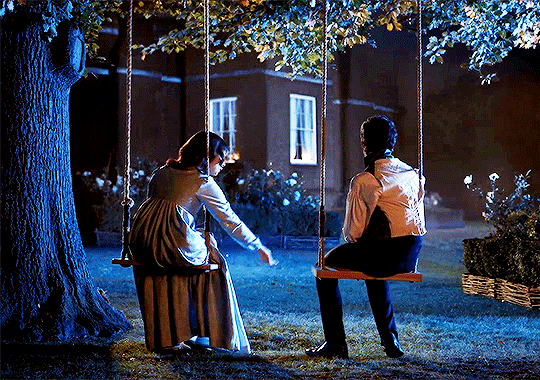
pairing: benedict bridgerton x fem!reader (but she doesn't show up yet, sorry lol)
summary: benedict's last moment of contentment before the storm that marooned his dreams.
warnings: very very brief mention of a gun, baby's first fic (it's me, i'm baby)
wc: 1.6k
next chapter // series masterlist

The Wiminet Art House sits just outside the limits of Mayfair, owned by the Dowager Baroness Lyra Wiminet. It is only half the size of a wing at Somerset House, and most of the artists are either anonymous or so unknown, they are as good as anonymous. It crams in an overwhelming number of pieces, barely a centimeter between each frame. It features a myriad of styles: soft landscapes, portraits, absurd finger-paintings, violent war scenes.
When it first opened, every London newspaper dismissed it as the eccentricity of a widow, mad without a man to guide her. There was no cohesion, they said. Downright tasteless. Where was the class? The refinement? It was a laughingstock for all of two days before the ton moved on as they always did.
It was also Benedict Bridgerton’s most frequented gallery. And Eloise had no idea why.
“You have been here at least twenty times in the past year, and they have only changed a single painting,” Eloise pointed out on one of these trips. Though she did not prefer to visit the same blasted gallery with the same blasted paintings, it was more merciful than watching Daphne and their mother flit about the house searching for the perfect dress to secure a proposal from the Prussian prince.
Plus her brother promised to buy her an apricot ice afterwards.
“What could possibly be left to see?” she asked.
They were standing in front of a rather large seascape, one that spanned a quarter of the wall. Benedict turned away to look at Eloise, a grimace upon her face as she tried to see what her brother saw. It was a quality Benedict most appreciated in her; she was stubborn and quick to snark, but she never wrote off his interests as frivolous. She was attempting to understand, even if she was staring at the painting like it personally offended her.
“Do you remember when you were eleven and Colin brought home that mystery novel for all of us? The one where an opera singer was killed in the middle of a show.”
“An Aria Most Deadly,” she recalled, smiling, “I couldn’t put it down. Col was scolded for bringing home such a—how did Mama word it?—terribly gruesome and improper book.”
He chuckled, remembering their mother’s scandalized face. As Colin was being scolded, she had set the book down on the settee. Eloise, ever nimble, snatched it and ran up to her room with nary a scuff across the floor.
“You re-read it over and over, looking for the clues, even after you’d finished it days prior. A snide comment from the stagehand that was once humorous turned dark. The author’s insistence on describing the location of the candelabra suddenly became obvious.”
“The details were so much clearer in hindsight,” she remarked.
“That is usually the privilege of hindsight.” He gestured back to the painting in front of them. “What do you see?”
She stared for a moment, tilting her head to one side to see if a change in angle would help. It was a turbulent scene, violent even, with outbursts of red and orange screaming amongst the cerulean and imposing slate clouds as the ship went down.
“A shipwreck?” Eloise answered with a shrug. “An unfortunately timed storm?”
Benedict stepped back, and grabbed Eloise by the shoulders, shifting her to the right so that she could stand in his place. “Do you see that spot of red on the ship?”
She squinted slightly. “Clearly, a fire broke out on the ship. Likely from the gunpowder catching on the wood. I mean, it says it in the title, Ship on Fire in Water,” she said, reading off the plaque underneath.
“But look closer at this spot of red at the front of the ship. Or that one by the captain’s quarters. Compare it to how the artist paints the flames,” Benedict insisted, gesturing to each area of interest. “He or she blends out the flames with orange and a bit of yellow usually. But these particular spots aren’t. They’re blended with brown. Maybe even a bit of black. That’s not fire, is it?”
Her eyebrows raised as the realization dawned on her. “It’s blood! Someone was killed. The captain, maybe?” She turned back to look at him in unbridled excitement at the newly-uncovered narrative.
Benedict smiled widely, crinkles forming around his eyes, watching his little sister finally get it, get him. “Possibly.”
“What do you think was the motive? Was it a mutiny?”
He shrugged. “That I am unsure of, dear sister. Every time I come back, I see something new. So, perhaps we need to look at it longer. Or make our rounds and come back with fresh eyes.”
Eloise had bounded off before he even finished.
They spent another two hours in the gallery, making little comments on each one, attempting to decipher a story from it. They even requested a step-ladder for the ones that had been skied because Benedict, having met Lady Wiminet, knew that there was no rhyme or reason as to the placement of each painting.
There was a most brilliant park scene about half a meter down from the ceiling. The artist did not draw a realistic, soft sunset, but a heightened one with punchy plums and a bright tangerine shade to blend. It was a bold choice that Benedict would’ve never thought of. The scene itself was of a promenade, much to Eloise’s displeasure, but she found amusement in mapping out the interpersonal relationships of the swans in the lake.
They made their way back to the bloodied, fiery ship shipwreck, standing in amicable silence before Eloise spoke.
“I understand it now. Why you've been here twenty times. Why you sketch until your fingers shake at dinner, but then use your drawings as fire kindle at night. You’re chasing greatness.”
“I want to get one of mine on these walls one day, El,” he said quietly, as if they weren’t the only people in the room. It was the first time he had admitted that ambition out loud.
“You will,” she replied, equally quiet back.
He sighed in relief. He wasn’t worried about Eloise’s reaction, though her vote of confidence was cherished. He was worried about being so unworthy that the words would refuse to roll off his tongue, lodging in his throat as a croak. But the idea was out there now, and a mirthful giddiness sprouted forth in the soil where his insecurities were rooted.
“I’d be anonymous, though,” he added after a pause.
She frowned, but neither of them made further comments on the subject. He already understood what she didn't verbalize. She dreaded living and dying in anonymity without a university degree or prolific novel attached to her name, something to outlast her that wasn’t a dullard husband or terrifying child. She could not stand the thought that the world might feel zero impact from her existence.
Benedict, however, was far less eager to sign his name on a canvas. He could be displayed in any gallery in England if he simply asked, regardless of whether he was even good enough. Who would dare criticize a Bridgerton painting, with nine generations of viscounts breathing down their necks? If he were to ever put his name on any of his work, he wanted—needed—to be so good that everyone would be too awestruck by what was in front of them to check whose name was etched onto the little copper plaque beneath the frame.
This was one of the only points of incongruence between the second eldest Bridgerton brother and sister that couldn’t be remedied by a simple anecdote or shift to the right. Though, perhaps there was no need for one; a painter would never ask a writer to adjust her palette and a writer would never tell a painter his meter was off-tempo.
It was an afternoon well spent away from the ornery obligations of the social season, coming home with their appetites spoiled from the promised apricot ices. Benedict grabbed An Aria Most Deadly from the library, and read the first few chapters before retiring for the night. He’d finished the novel after he pried it away from Eloise years ago, so he knew it was the conductor who had killed the opera singer. This knowledge only pulled the deftly placed clues into crisp focus upon this second reading; even the first chapter was littered with hints.
Perhaps that is why when he sits in the viscount’s study, the one that was never supposed to go to him, he often thinks about the night of Granville’s party. That night began with him feeling so alive, more alive than he could ever fathom. Yet, it ended with a sinking stone of dread taking up a months-long residence in the pit of his stomach.
Were there clues he should’ve seen?
If he’d been less drunk off the wine or the women or both, he’d have noticed Daphne wasn’t wearing the necklace gifted to her by the prince, even though he clocked the ostentatious clunk of jewelry when she left for the Trowbridge Ball. Or that the hem of her dress was muddy and her face was pinched, on the verge of tears.
If he wasn’t so preoccupied with how to take advantage of his freedoms as the spare of the family, he’d have noticed the blooming violet bruises on Anthony’s knuckles as he yanked Benedict into the study with considerable force.
It wasn’t until he was rolling his shoulder, about to complain that his arm could've been popped out of its socket, when the gun box was placed on the desk with a resounding thud.
Things only clicked into place as Anthony began frantically talking about estates and dowries and an appointment with the duke at dawn, but there were signs from the moment he walked in the door.
The details were always so much clearer in hindsight.

next chapter // series masterlist
a/n: they dropped new abc pictures last month, and i decided to make it everyone else's problem by starting this fic. now it’s bridgerton eve!!! rejoice!!!
#benedict bridgerton#bridgerton fanfiction#bridgerton x reader#bridgerton fic#bridgerton imagine#benedict bridgerton x reader#bridgerton#bridgerton netflix
207 notes
·
View notes
Text
Cohesive storytelling
The beauty of Skeleton Crew (so far) is that there is clearly an overall storyline that serves as a scaffold for the ongoing character and plot development rather than a mish mosh of disparate episodes stuck together without glue. The different directors add their own flavor to each episode, and the characters take turns having their moments to shine, but the puzzle pieces seem to be fitting together in a coherent way that will result in a satisfying season finale. Another plus is that if you know very little about Star Wars, the show is still understandable, and if you're a Star Wars nerd like me, you can pick up on the various nods that are interwoven throughout (blessedly without Big Neon Signs Saying Hey Here's An Easter Egg You Guys!!!).
A very tiny example of dialogue being part of this process: In Ep. 5, the resort hostess whispers to her underlings that they may have a Waste Management issue concerning the Onyx Cinder, then in Ep. 6 it makes sense when the waste removal drones show up to haul the ship away to the trash heap. And then we get that glorious surprise when the kids manage to save the ship by blasting away the same outer armor that Tak Rennod referred to in his holo message.
Like the Onyx Cinder, the story itself is a nesting doll by providing hints and clues (some more obvious than others) of what may come somewhere down the line. So far, they've managed to keep what pops up fun and fresh regardless of its predictability. I'm hoping the last two episodes twist things in unexpected directions, yet retain the storyline cohesiveness that's been built up along the way.
I especially look forward to seeing how this space pirate and his first mate interact now that Jod is SM-33's captain. They are such a dumpster fire together, yet can be genuinely deadly at the same time!
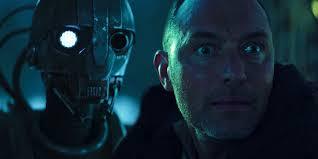
#skeleton crew#skeleton crew spoilers#spoilers#star wars#it is so refreshing to have classical storytelling methods#so tired of the jumbled messes we've been served up across media for years#sm-33 is my bud by the way
59 notes
·
View notes
Text
AOT character & their personal fashion styles
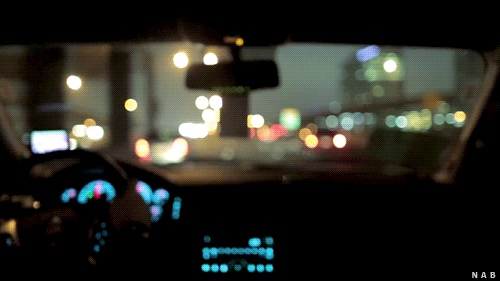
characters : Eren Jaeger, Mikasa Ackerman, Armin Arlert, Jean Kirschtein, Connie Springer, Sasha Braus, Marco Bodt
warning: all of these are just purely based off of my personal insight and views of the characters and how i think they’d dress today
🪩🥡🪐🎸🎧
Eren Jaeger: 🎱🌪️🩻⛓️
based off of season 4 Eren
i picture Eren in todays world really rocking with a minimalist street style
he’s all for comfort and breathability in his clothing and his style reflects that
a closet full of loose fitting boxy t-shirts
LOVES the cold months so he can layer his hoodies and leather jackets
while also sporting the slutty tightly fitted black shirt grey sweat pant combo every now and then
maybe even just walking out his apartment with a wife pleaser and baggy jeans on as a fit alone
all paired with sneakers, small silver hoops, and a chain of some sort
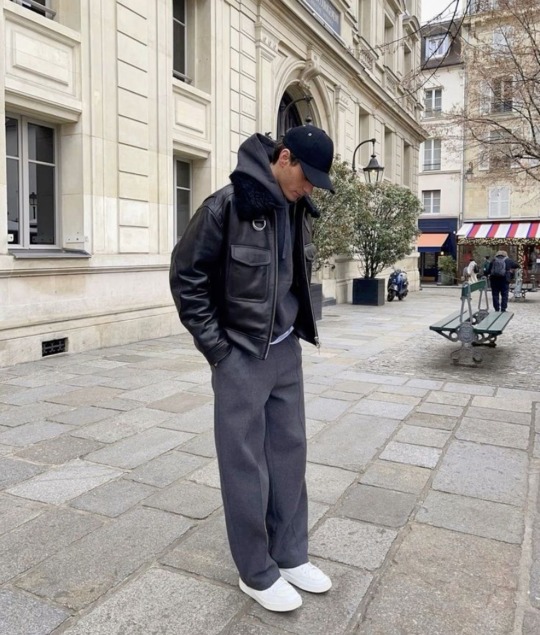
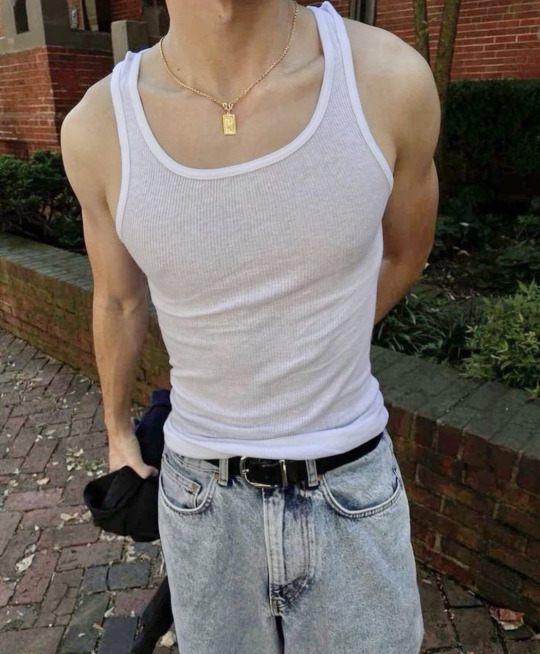
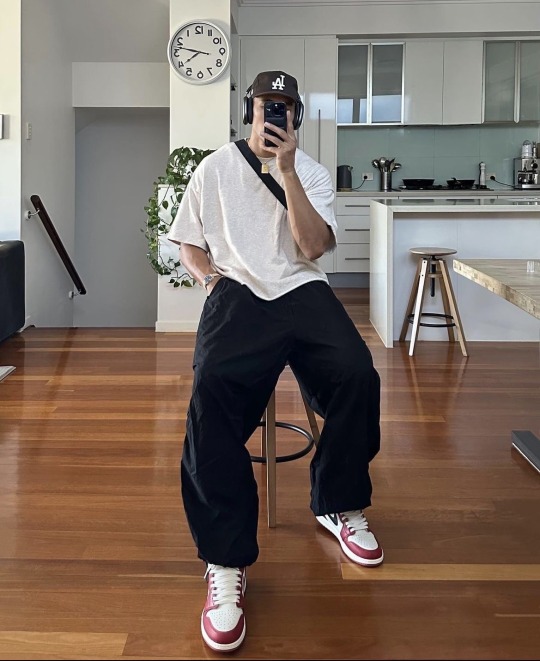
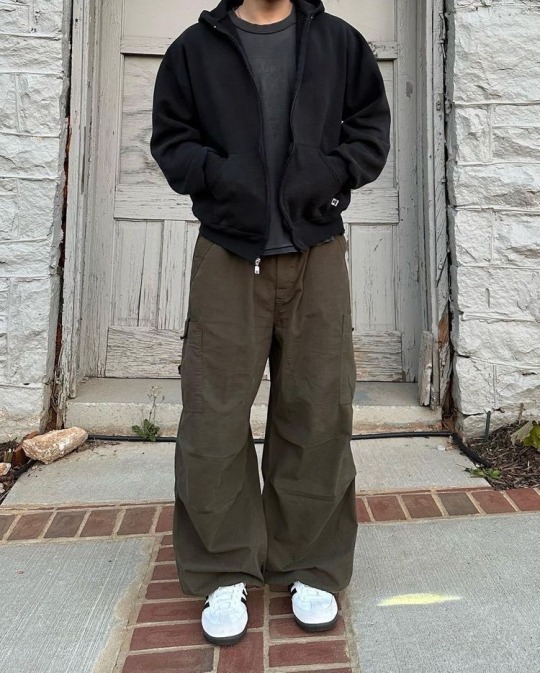
Mikasa Ackerman: 🍒💿📷🃏
we all know for a fact that Mikasa can DRESS
she just has an eye for fashion and has a unique style of her own
one that isn’t over the top, in terms of being a spectacle, but just well put together and tailored to HER. a girl you 110% give a second glance
she is a girlie who LOVES wearing any skirt whether it be long, midi, mini or knee length she LOVES them
most of her pieces are pretty free flowing with lots of different silhouettes
absolutely loves a good leather boot, pair of mary janes, or platform loafers
she literally could wear a trash bag and make it look like it’s the next trend
and has a huge collection of baggus



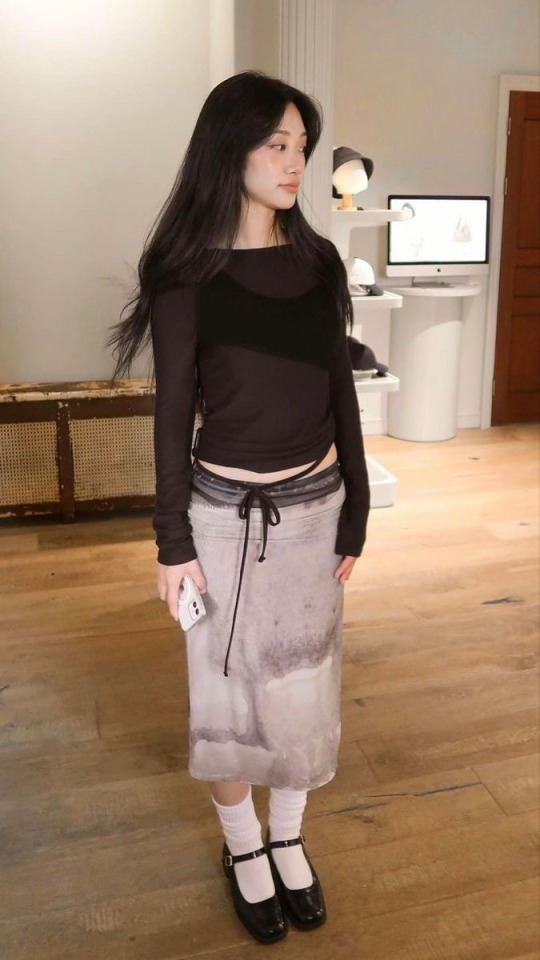
Armin Arlert: 🎧📘🍵☁️
Armin will literally never be free of the soft light academia aesthetic
the cable knit sweaters, soft cardigans, and sweater vests will forever have a hold on him
but what college boy Armin loves more than anything is a good quarter zip or quarter button up
or a nice casual white and blue striped button up
almost all of his clothing is soft and warm materials
definitely withholds the cute boy in the library title

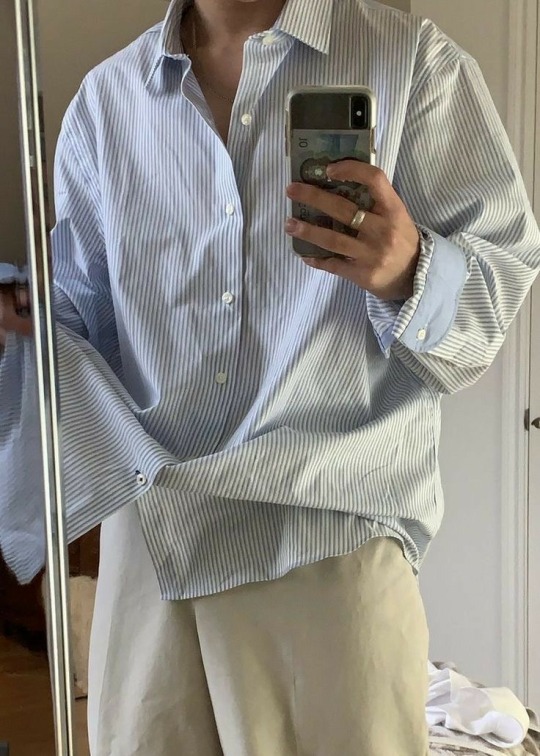
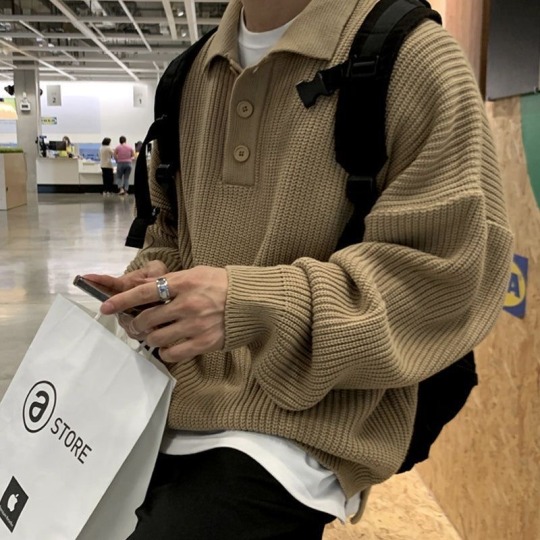
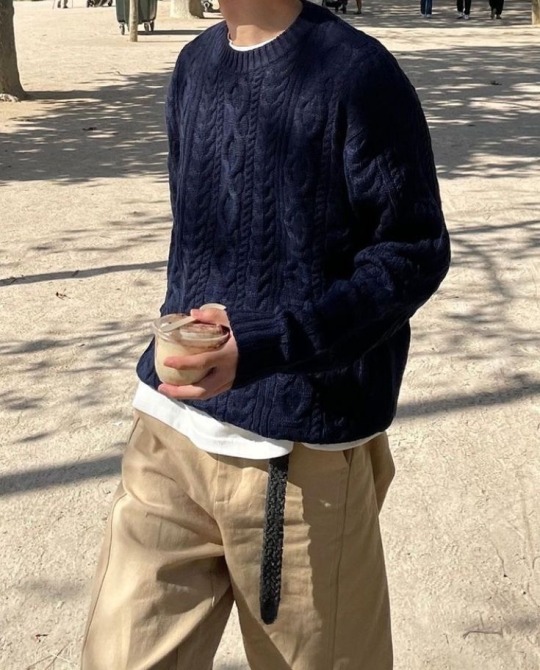
Jean Kirschtein: 🪐👁️🗨️⚡️🌉
will live and die on the hill that Jean is a Carthartt guy
his look is a casual-relaxed but clean one
he’s all for clothing that is durable and will last him forever
Jean’s style is honestly super basic but NOT boring
although Jean’s style isn’t one that is made to make it hard to look away from its one that really just compliments him well
loves a good hefty Dickies or Carthartt jacket, basic white t-shirt, or a loose button up over a tank top
while wearing a variety of rings, with small hoops and a chain
his clothes compliment his strongly built and lengthy body well, which is why although they are basic, it isn’t boring
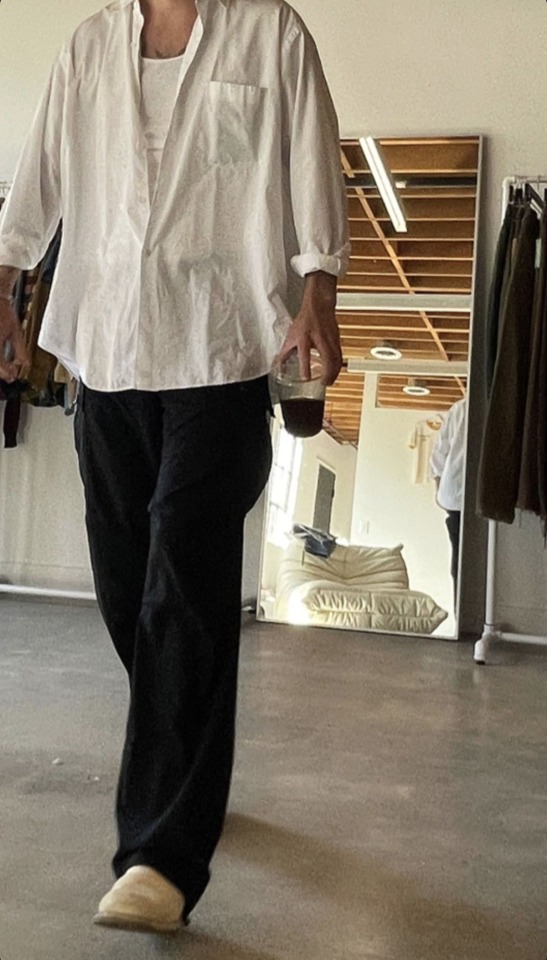

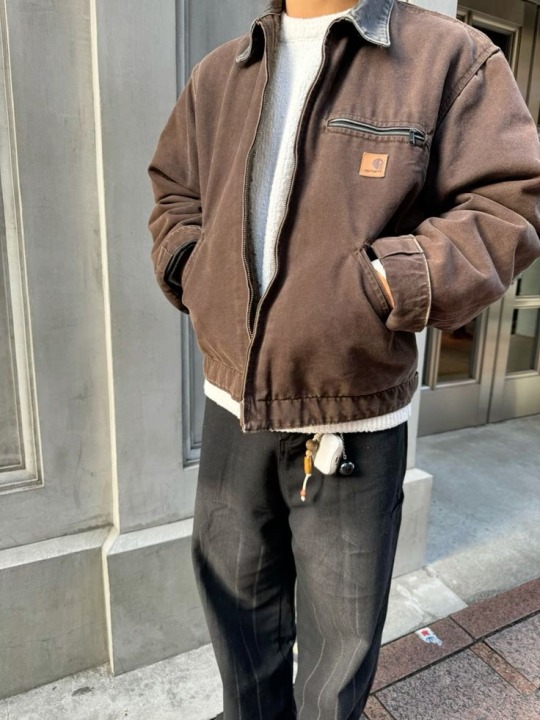

Connie Springer: 🎧💽☄️🩻
Connie is a literal fashionista
he probably is tiktok famous for his fit check videos and adventures at the thrift stores
the street style aesthetic was MADE for Connie
knows how to put pieces that may not look ideal together into a cohesive fit
LOVES JORTS and swears he made them trendy again
and wearing jerseys of teams he has no clue of , but it’s for the fit so who cares
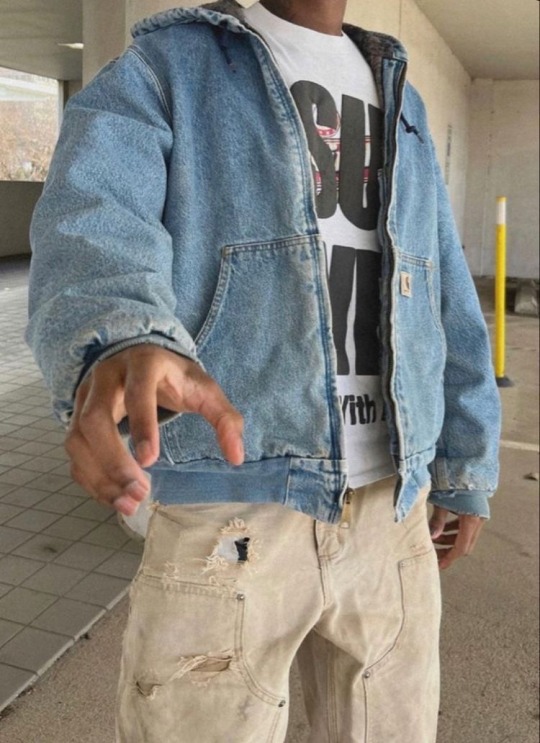


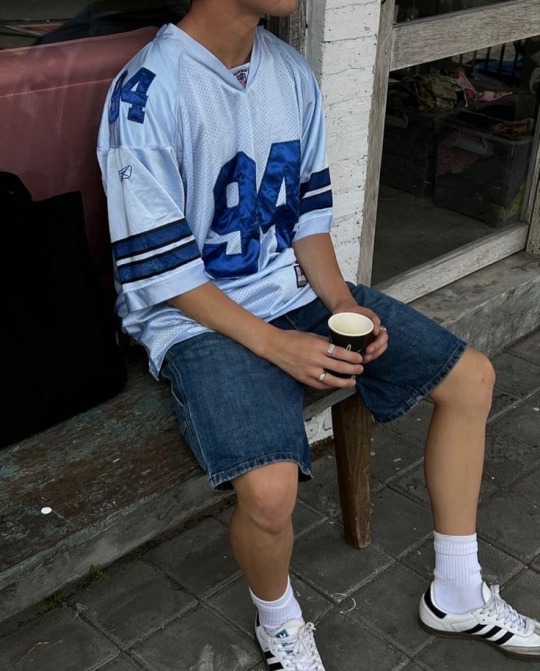
Sasha Braus: 🍰🪩🗽🧸
the DEFINITION of downtown girl or coming of age movie in a city aesthetic
Sasha lives for the nostalgia of 90s pieces and it shows in her clothing
comfort is also a huge factor that plays into Sasha’s outfits
color is another component that makes Sasha’s outfits HER outfits
LOVES a good brown leather jacket
Sasha honestly though has a hard time sticking to just ONE specific style and will wear whatever feels good for her

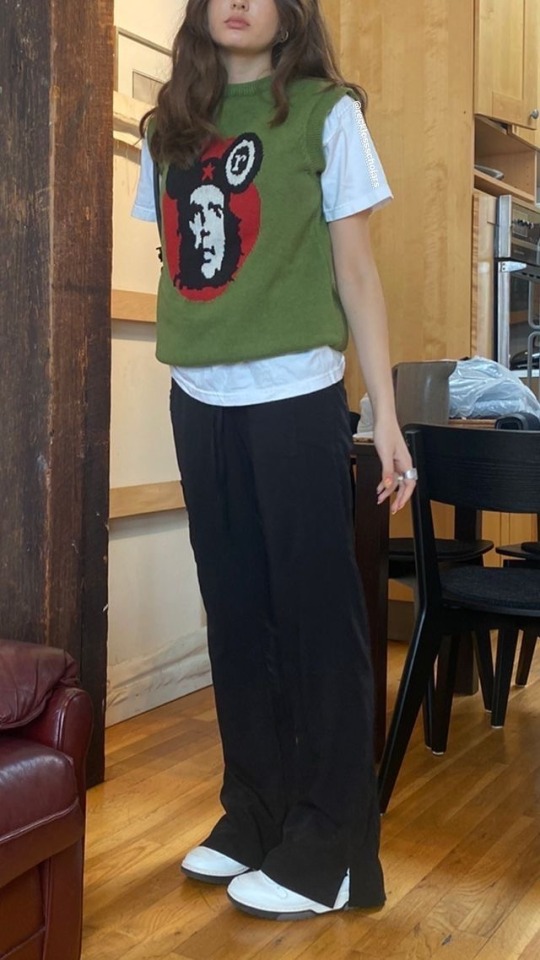
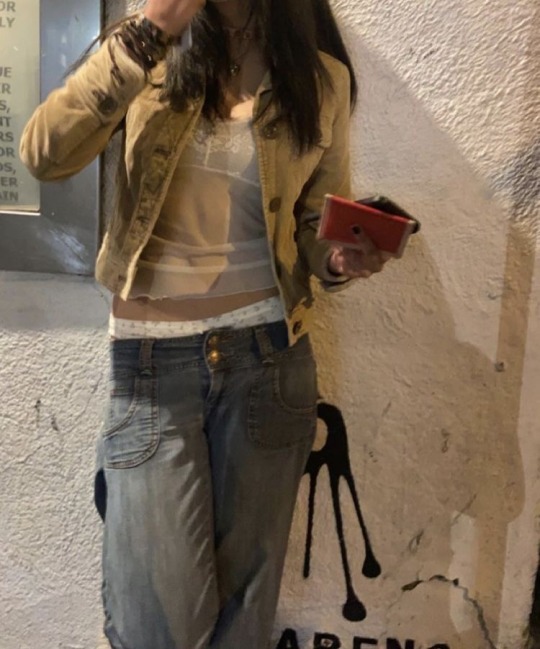

Marco Bodt: 🍙🪴♠️🍊
Marco is a soft boy at heart but he’s traded in the traditional sweaters vests for hardy collared jackets
he absolutely LOVES PLAID
and loves layering his button ups with his worn out thrifted jackets
has a more warm palette in terms of colors and leans more towards earthy tones
super casual in his shoes though sticking to good tried and true high top converse, sambas, or loafers if he's feeling fancy
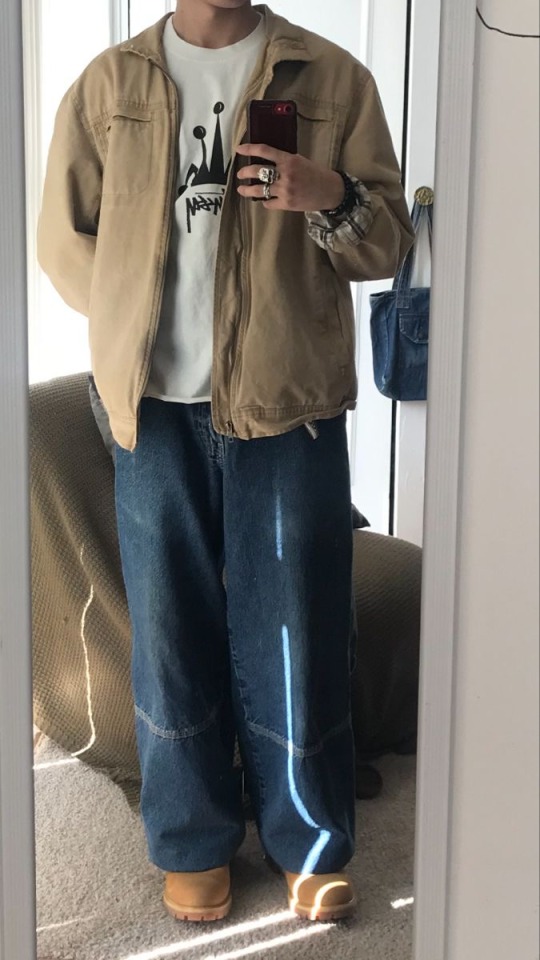
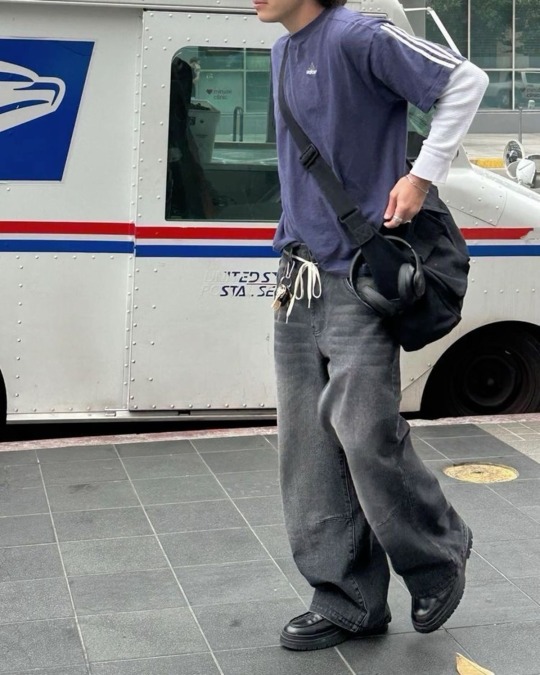

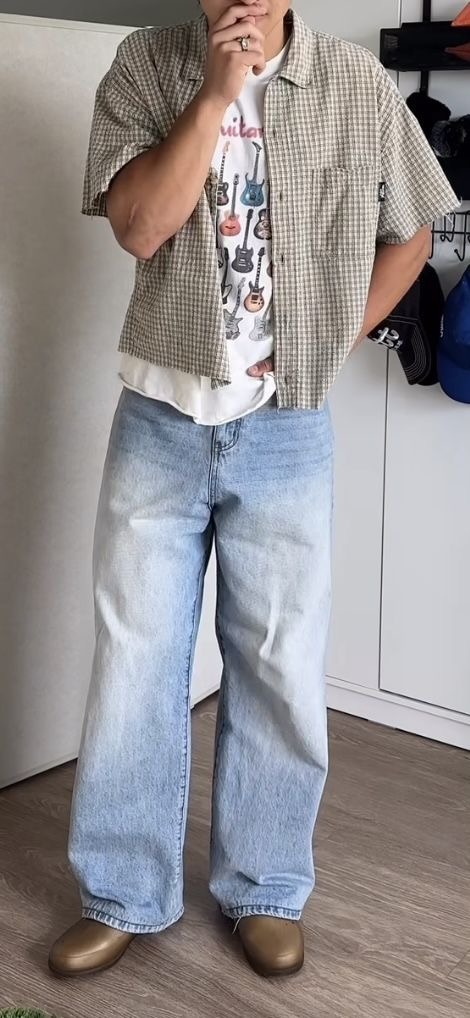
#eren jaeger#mikasa ackerman#armin arlert#connie springer#jean kirstein#sasha braus#marco bodt#aot modern au#aot x reader#attack on titan headcanons#aot college au#Spotify
335 notes
·
View notes
Text
I rewatched the Helluva Boss trailer today and tried something different. Instead of looking for upcoming details or clues about what might happen, I looked for a narrative. I tried to imagine what the editors were thinking as they chose clips (both visual and audio) to include, and why.
I thought that MAYBE in light of having seen two of the episodes (and weeped over them, and analyzed them into the ground) most heavily featured in the trailer, I might learn something from doing this.

My conclusion is *drumroll* that the clips were chosen to introduce problems. AND NOT TELL US ANY OF THE OUTCOMES SO WE WOULD FUCKING SUFFER. Not too different from a movie trailer really.
So there are four main problems set up. Each of them are set up to make us ask questions.
Villains: Oh, what an array. Cherubs, Dhorks, new John Waters villain, Andrealphus, shadowy figures in hoods, Mammon flipping off the camera, etc. We're given very little information about how any of these confrontations will go. We just know there will be conflict/danger.

2. Blitz vs. self: "you always take from those around you . . ." "do you feel any kind of remorse for what you do?" "I make everyone's lives worse." "I don't want to be this way, not forever." One could argue that we've already seen tremendous growth with that last quote appearing in Apology Tour. I think that if I saw this group of quotes together without the context of the episodes so far, I would have assumed it would come last. But I think it's the beginning of a journey. We haven't heard all of these lines yet. And the ones we haven't heard might get closer to the self-loathing Blitz is dealing with than anything we've seen yet. These lines are telling us about a problem- again, the outcome is left blank. How will Blitz transform once he discovers that he wants to change and starts confronting the truly scary things living inside of him.

3. Stolitz: Okay so ALMOST everything in the trailer that has to do with their relationship is from either The Full Moon or Apology Tour. And in retrospect, it was pretty spoiler heavy. Maybe this is my shipper delulu speaking, but I think the writers/editors were okay with the trailer giving this much away from these two episodes BECAUSE these episodes set up the problems with their relationship and do not reveal the outcome.
The problems are ones we knew existed but have now seen tear them apart: Stolas wanting someone to care and Blitz wanting to be respected, the fact that they both love each other and want to be together but each think they're not wanted. Then there's the cruel as fuck framing where the trailer puts together Blitz looking at Stolas in awe and Stolas smiling as if they're in the same moment, only for us to find out in the actual episode that someone else is making Stolas smile.
Anyway, this is all to say that yes, I think that narratively they will get together at or near the end of the season. The trailer tells us that they both love each other despite the problems that are laid out. The solution IS for them to come back together somehow. And the trailer gives us that split second clip of Blitz defending Stolas to . . . I don't know . . . stop heartbroken shippers from rage quitting the show altogether after Apology Tour.

4. Stolas and Octavia: when it comes to the first two episodes in this group, this one has been visible in the show only through Octavia's absence . . . But if we look at the trailer as setting up problems, the problem is clear. "You never loved mother and you don't love me. You love him." Shit is going to hit the fan. And again, we have no idea what the outcome is going to be.
So conclusions?
Trailers are a cool art-form. They have to be narratively cohesive without giving away any outcomes. They have to make us want to see more. They can scare us but they can't be so depressing that they make us give up.
We didn't get random parts of the upcoming story. We got the earlier parts. At least, the earlier parts of each conflict (likely to be spread out somewhat), but please notice that the trailer has told us VERY LITTLE about Mastermind and Sinsmas.
There's very little reassurance in the trailer. It's supposed to be that way. But we do have hints that stolitz will be okay. Trust.
#stolitz#my helluva meta#blitzo buckzo#blitz#blitzo#stolas goetia#stolas#octavia goetia#seriously I did this because I'm content starved help me
119 notes
·
View notes
Text
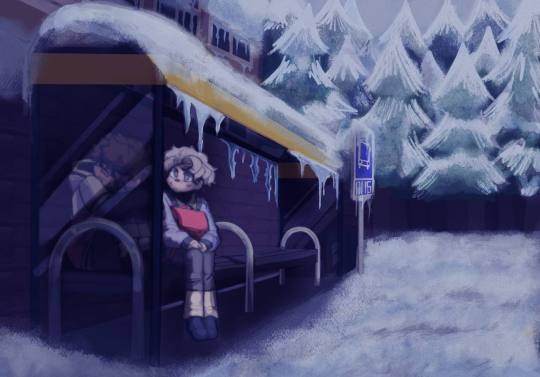
the small... the itty bitty.. the sad sniffles..
(hi guys!! needed a break to deal with something, but hopefully I can actually try a schedule for posting stuff soon :3 )
uhh I got designs + barely cohesive context right below:

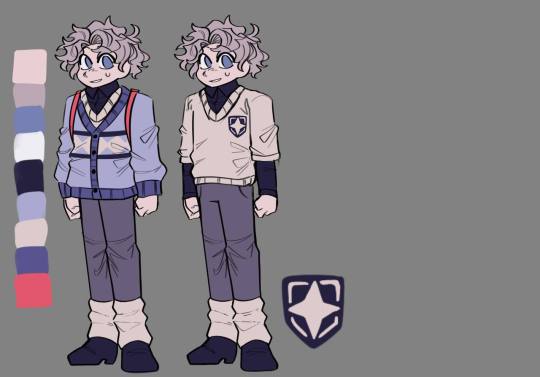
I love these SILLIES!!! don't mind how empty Winnie's page is, I didn't know what to do
decided that giving them school uniforms to match the surrounding this took place in was a ok decision so I did that!!
also here's the rlly confusing context I made in the middle of the night whilst accidentally pulling an all nighter at the same time:
(I have 0 experience in writing anything in general, I was spouting whatever made sense in my head so if you think this is ooc for them, it probably and most likely is lmaoo. sorry in advance to everyone who was curious ehough to read whatever... this is considered..)
anyways, prologue takes place in an elementary school where Winnie just finished his day at school, it didn't go that well but y'know, there's 10 more things to worry Abt then that. He gets to the bus stop, knowing well he was gonna have to stay there for awhile and planned on making himself comfortable. Upon arriving, he hears sad sniffles from across the seats and boom, sad lil meow meow auggie appears!! Very concerned Winnie approaches the kid, proceeds to get a very hot headed response from him as auggie pushes him away (he isn't having any of it today + he was kinda a punk when he was little like damn!!!) Winnie clearly sees that the dude needs ATLEAST *some* company so he just, sits by him awkwardly. Augustine over here doesn't have a clue why he's still not going away but accepts it nonetheless, albeit in a very tsun tsun way I guess. Winnie takes this as a small talk starter and tries to engage with him, to no avail as auggie seems to have a very reserved manner when alone. After a few minutes of trying, he decides to just be straightforward and ask him what's up, to which Augustine replies with a 'none of your business, why do you want to know?' type of response. He just tells him that moping around wasn't gonna do him any good and since they both seem to be going home late anyway, might as well kill time. (on second thought, they sound very adult for 7-12 yr olds, what. I will come back to reread this dw) Augustine now knows Winnie doesn't mean any harm and decides why not, got nothing else to do. He proceeds to tell him regarding how others seem to only want to be around him whenever he acts a certain way (ie, very bubbly, friendly, etc) and thinks about whether or not people actually do like him for himself. It also makes him feel like if people actually knew how he was, not many would stay (like a 'yeah I want people to stay, but I want them to stay for who I actually am' type thing). Winnie tells him that he should be himself, regardless of what anybody else thinks otherwise. Additionally, Winnie thinks that if nobody's willing to stay after seeing the truth, it's their loss honestly, he thinks Augustine should care about people who would actually be there for him, not for who he's trying to be. Augustine is somewhat stunned by this, asking if he's been through this before, to which Winnie remarks with a similar situation happening back in his previous school (Winnie's friends didn't stay in touch and never contacted him ever since he moved). They pretty much notice atp how similar they were and decided to spend to the entire time waiting just chatting, turns out they got along very well (cue scenes of them yelling at each other playing games, cat scratching as they yell something dumb at the other while simultaneously talking about how cute the cats walking around were). Time passes and bam! Winnie's mom finally comes over to pick them up!!
"Hey! I know that lady! She's my mom's neighbour! :O"
"Oh, it's my mom-- How do you know my mom???"
"Uh, duh!! >:/ I just said that she's my mom's neighbour--- she's your mom!?!?"
(Cue them getting inside the car and getting bits about how Augustine and his mom met. Apparently, he and his mom visited to send off some gifts for her, when in actuality, it was to send off some medicine for Winnie, who was sick during this time. Of course they got some gifts but the medicine was important. And the gifts were too.)
As they got closer towards their houses, Winnie was planning to just go back inside the house immediately since he's got no plans going on and assumes that was it. Augustine thinks otherwise, so when they both got out of the car, he immediately blurts out his name and introduces himself. Winnie, realizing this entire time they haven't even said their names towards each other, also introduces himself in response.
They both seem to connect easily and since no one else was willing to, they will instead. With a promise to stay by each other's side no matter what, they both spent their entire childhood together. They were practically two peas in a pod, nobody ever saw them apart, even if they were in a group of people. They stood out by a lot since then, the very loud and obnoxious kid was hanging around with someone who could chill him out in an instant. The two were inseparable
#cold front swap au#swap au#cold front#augustine orlov#winnie bosko#again im so sorry to whoever reads the context it is actually kinda bad#not sure why i decided to do rhat homestly but oh well its out in the world now for people to look at#yippee for me
109 notes
·
View notes
Text
I have such a love/hate relationship with the Assassin's Creed series.
On the one hand, I hate that it feels like Ubisoft is maliciously designing this franchise to eternally suck money out of my wallet without ever giving me narrative closure or quality design. Like, there are so many cynical at best design decisions in this series. For context, I'm currently playing Assassin's Creed Valhalla, and I've already played every mainline title up to this one, except for AC: Unity, because I've decided to die mad about the whole "It's too hard to make a female playable character" thing. And for a long time now, it feels like each new title is shallowly chasing industry trends in order to try to appeal to a more mainstream audience. In AC Valhalla, there are so many mechanics straight up lifted from other popular games, but implemented so poorly and in such a vestigial way that it doesn't feel cohesive. Like, they tried to implement the pawn system from Dragon's Dogma for some reason, or the puzzles from Senua's Sacrifice. And this is a sad look for a series that was at one time so groundbreaking that it was influencing other franchises instead. In addition to just stealing a grab bag of mechanics from other games, Assassin's Creed is sacrificing its own unique identity to emulate other popular genres, with the combat in AC: Valhalla feeling way more soul-sy than it has any rights to. I mean, there are straight up boss battles in this game.
Boss Battles. In an Assassin's Creed game.
And you can't even just straight up assassinate anyone anymore. Like, if the opponent NPC is a higher level than you, than an assassination is basically just a fancy attack that does a little extra damage. Meaning there's hardly a reason to bother with stealth anymore, you might as well open up combat with a big flashy ability that will at least stun other opponents.
To their credit, you can change this in the Settings. In fact, if there's one thing they put a lot of effort into designing, it's the difficulty options. You can make it so assassinations are always an instant kill. You can make it so that opponents are always the same level as you. You can precisely calibrate how much damage you give and receive. There are also difficulty options for the stealth and for the exploration. You can literally remap the controls however you like. Honestly, I laud them for this. Although a cynical side of me feels like it's also indicative of a weak vision for the game. Rather than crafting an experience for a specific audience, it's another attempt to design for broad appeal.
All this is not to mention all the crap they've gotten up to with their monetization strategies. That could be a whole other post.
I've stuck with the series due to my interest in the story, and it feels a little like they're holding that interest hostage. Each new release gives me tantalizing bread crumbs, but little if anything is ever truly resolved or answered. It leaves me wondering if there's any kind of master plan for the whole thing, or if they're literally just stringing me along with whatever bullshit they think will keep me engaged with no end in sight.
But on the other hand, sometimes those bread crumbs are so good.
Like, there's at least one person on the development team (and probably far more) who is putting real time and effort into making a well researched, intricate, interconnecting story. Someone who makes me feel rewarded for my 100% completion tendencies with all these little nuggets of story and character and clues that feels like it all adds up to something special.
A moment for me in AC Valhalla that reminded me of why I like this series so much is when the viking protagonist travels to "Vinland" and meets some First World People there, who in the game are speaking Iroquois. And there is no translation. Like the protagonist, you are stuck guessing what they are saying from their body language and context clues. It's such a cool way of getting you immersed in the story and setting, and it really stuck with me. And then of course I searched online for a translation, and it feels like the writing team integrated the lore and culture here very respectfully. Like with ACIII, it's clear they consulted with real current speakers of the language, and in addition there is an inclusion of a Mohawk creation myth (which also ties into tidbits explored in both ACIII and AC Rogue). And those creation myths might have been shared simply as a nod to the culture being presented here, but it might also tie into the greater mystery surrounding the Isu, which is cool to speculate about.
Basically, there are some really cool storytelling things happening in this series, and it often motivates me to research and learn a bit more about real history. I just can't give it up.
I've heard that AC Mirage was more of a "return to basics", and optimistically I hope that means the game mechanics are returning to more of what gives Assassin's Creed it's own unique identity. But as long as they keep giving me those narrative nuggets of gold, I'm stuck for the ride.
58 notes
·
View notes
Text
Working at a Renaissance Faire for 18 years has made me totally immune to thinking it's a failure of Bell's Hells to not have unified opinions.
Literally no one at a Renaissance Faire agrees on how shit should be done or what's most important to do or what improvement would even look like or whether anyone's ideas would even work. There are people who have been threatening to quit for a quarter of a century because they're sick of putting up with everyone's stupid bullshit, but they'll be back every single year until they drop dead and we build them a memorial while carrying on in their names.
That's just what it takes to get shit done in the real world. People talk about activist groups like they had unity and every battle planned out, but I promise you they were also a bunch of disagreeable squabbling geese honking at each other while still flocking. Various factions always think others with virtually identical views are standing in the way of progress and true liberation with their stupid ideas and actions.
Even the AIDS quilt, widely regarded as one of the most moving works of political art ever created, had plenty of other queer activists who thought it was a bad idea holding back real progress. So did the Civil Rights Movement March on Washington where MLK gave his I Have A Dream speech. Climate change scientists on the bleeding edge of research into how to best protect the planet are constantly getting into passive aggressive paper publishing wars about why each other's conclusions are total horse shit. The work gets done anyway.
You bitch at each other about how things should get done, but crucially while also doing the work and making the next decision in front of you. Then writers look back later and pretend all those decisions were cohesive and everyone definitely agreed this was the correct path to take. That's what we put in all the stories. But the truth is that everything seems like incoherent bickering while it actually happens because no one knows what the results will really be. It's holding out for unity and clear solutions that actually undermines progress. All that really matters in the end is you keep working together to make things better. Because really none of us has the faintest clue what better really is.
To me that's a story worth telling.
40 notes
·
View notes